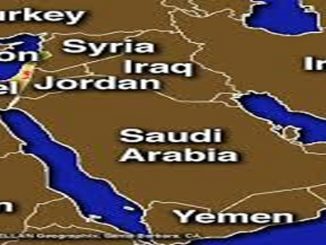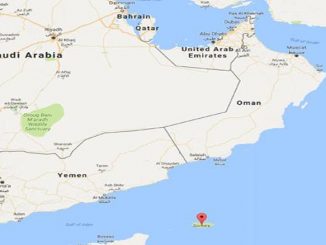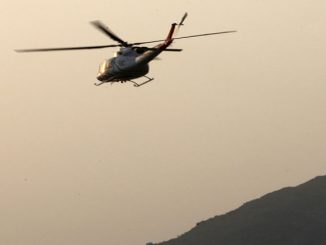
Yemeni Houthis warned they would face ‘escalation with escalation’ following attack on detention center that left more than 100 dead
Yemen’s Houthi rebels have threatened further escalation after two ballistic missiles launched by the group were shot down over Abu Dhabi on Monday morning.
The attack, the second in a week targeting the United Arab Emirates, was aimed at the al-Dhafra air base as well as “vital and important” locations in the Dubai area, according to a statement by the group.
In response, the UAE defence ministry said it targeted a missile launcher in nothern Yemen’s al-Jawf province.
Last week, a drone and missile strike by the Iran-aligned Yemeni movement killed three people in Abu Dhabi.
Tensions have risen following a Saudi-led coalition strike on a prison in Saada, a Houthi stronghold, on Friday in which at least 100 people were killed, one of the deadliest single attacks in the ongoing conflict.
A second attack on Hodeidah shut off the country’s internet. The internet connection in Yemen remains largely out.
In response to the “massacre” on Friday, the Houthis told foreign companies to begin pulling out of the UAE as they were “investing in an unsafe state as long as the rulers of this state continue to attack our country”.
“We are ready to expand the operation during the next phase and confront escalation with escalation,” Houthi spokesperson Yahya Saree said in a televised statement.
The Houthis also fired a missile into southern Saudi Arabia, wounding two people.
Emirati officials said they had intercepted two missiles over Abu Dhabi, spraying debris across the city, but did not report any attack on Dubai.
The UAE is part of the Saudi-led coalition that has, since 2015, been fighting the Houthis in Yemen.
The Houthis have also regularly targeted Saudi Arabia with drones and missiles in recent years.
UAE-backed pro-Yemeni government forces have scored major successes in recent weeks, pushing the Houthis from the oil-rich southeastern province of Shabwah and making headway into Marib to the north.
Those advances prompted the Houthis to begin targeting Abu Dhabi directly, and since the attack on 17 January on the emirate’s airport and oil facilities, the Saudi-led coalition has pummelled Houthi-held areas of Yemen.
The UN estimates the war in Yemen had killed 377,000 people by the end of 2021, both directly through violence and indirectly through hunger and disease.
It has also declared Yemen the “world’s worst humanitarian crisis,” as a Saudi-led economic blockade on Houthi-controlled areas and air strikes have hampered access to health care and increased pressure on the few facilities that are still functioning.
Likely re-designation of Houthis as terrorists
UAE ambassador to US said he would join Emirati intelligence chief in meetings with White House and Congress to discuss the likely re-designation of Houthis as terrorists
The United Arab Emirates on Wednesday called on the United States to re-instate the Houthis as a terrorist organization, days after the Yemeni group launched a drone attack on Abu Dhabi killing three people.
Yousef al-Otaiba, the UAE’s ambassador to the US, called on the White House and Congress to support the re-designation of the Houthis, a year after US President Joe Biden lifted their terrorist labelling.
In a tweet posted by the UAE embassy in the US, Otaiba also summarised a call between US Secretary of Defense Lloyd Austin and Abu Dhabi Crown Prince Mohammed bin Zayed.
“They discussed urgent steps to tighten air defenses against missiles and drones & enhanced maritime security to stop weapons flows,” the embassy tweeted.
Defense Department spokesman John Kirby hinted at the prospect of arms sales during a press briefing on Tuesday, stating the US had a “very robust defence partnership with the UAE, which does include foreign military sales of various different types of weapons and platforms.
“We are in constant discussion and dialogue with our Emirati partners about ways we can strengthen that defense partnership,” he said.
Later on Wednesday, the UAE embassy said Otaiba and UAE intelligence chief Ali al-Shamsi will hold meetings in the White House and Congress.
Just prior to Biden entering office last year, his administration said it would immediately review the designation of the Houthis as a foreign terrorist group – a move made by the Trump White House.
In February 2021, the Biden administration followed through on the plan and removed the group from the terrorist list, and also announced an end to US support to offensive operations in the Saudi-led coalition’s war in Yemen.
A US terror designation against the Houthi movement could further isolate the rebels, but it also poses the threat of making the humanitarian crisis in Yemen worse.
Yemen’s internationally recognized government has been fighting the Houthi movement since 2015, after the rebel group took over the country’s capital Sanaa.
The ongoing war has devastated Yemen, with an estimated 80 percent of the population – 24 million people – requiring some form of humanitarian or protection assistance, according to UN office for humanitarian affairs.
Saudi Arabia and its allies have been major backers of the Yemeni government. Meanwhile, the coalition has accused Iran of arming their Houthi rivals, a charge both Tehran and the rebels deny.
Monday’s attack on Abu Dhabi’s airport and oil facilities by the Houthis, which killed three people and injured six others, is considered to be one of the biggest on the Gulf nation in recent years.
A Houthi leader in Sanaa previously told MEE that the group was “targeting the UAE this time because it returned to the frontline of the Yemen conflict again to fight us while we were about to take over Marib”.
UAE-backed forces have pushed the Houthis out of the southern province of Shabwah and parts of Marib with the backing of Saudi air strikes.
In 2019, the UAE began reducing its military presence in Yemen, but retains influence through its backing of Yemeni fighters.
A few days ago, a number of top US lawmakers condemned the Houthi attack and called for concrete action against the group.
Republican Senator Todd Young, a member of the Senate Foreign Relations Committee, said the drone attack demonstrated that the Houthis “are determined to continue the conflict and exacerbate the world’s worst man-made humanitarian catastrophe”.
Young did not mention whether the US should redesignate the Houthi group, and has previously cautioned against making such a move.
“The United States must respond forcefully with sanctions on Iran to cut off its support to the Houthis, while also ensuring that our partners in the region have the weapons necessary to defend themselves in the face of these attacks,” Young told Middle East Eye.
Chris Murphy, a Democratic senator and fellow Foreign Relations Committee member, also condemned the attack, saying it is “deeply concerning and a serious threat to the civilian population of neighboring countries – including tens of thousands of American citizens”.
Murphy also noted the recent Saudi-led coalition air strike in Yemen’s capital Sanaa, which killed 20 people including civilians.
“It is incumbent on all parties to the conflict to avoid targeting civilians and civilian infrastructure,” Murphy said in a statement.
“Unfortunately, these incidents will likely continue as long as the war drags on. The international community must do everything possible to bring the fighting to an end, and it is incumbent on all parties to the conflict to prevent further harm to civilians.”



